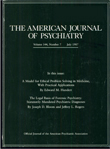A Direct-Interview Family Study of Generalized Social Phobia
Abstract
OBJECTIVE: The goal of this direct-interview family study was to replicate and extend an earlier finding of a familial liability for social phobia. The authors hypothesized that there would be higher rates of the generalized type of social phobia—but not the nongeneralized (or “discrete”) type—among relatives of probands with generalized social phobia. They also hypothesized that rates of avoidant personality disorder, a frequent comorbid condition, would be higher in relatives of probands with generalized social phobia. METHOD: The authors examined rates of three social phobia subtypes defined a priori—discrete, nongeneralized, and generalized—as well as rates of avoidant personality disorder by direct interview of 106 first-degree relatives of 23 patients with generalized social phobia and 74 first-degree relatives of 24 comparison subjects without social phobia. RESULTS: Relative risks for generalized social phobia and avoidant personality disorder were markedly higher (approximately 10-fold) among first-degree relatives of probands with generalized social phobia than among first-degree relatives of comparison probands. In contrast, relative risks for discrete social phobia and nongeneralized social phobia were not significantly different between the two groups of first-degree relatives. CONCLUSIONS: These results confirm earlier findings of a higher rate of social phobia among relatives of probands with generalized social phobia and extend these findings by specifically indicating that it is only the generalized type (and its probable axis II counterpart, avoidant personality disorder) that occurs more often among the families of probands with generalized social phobia. Implications for subsequent genetic studies are discussed. (Am J Psychiatry 1998; 155:90–97)



